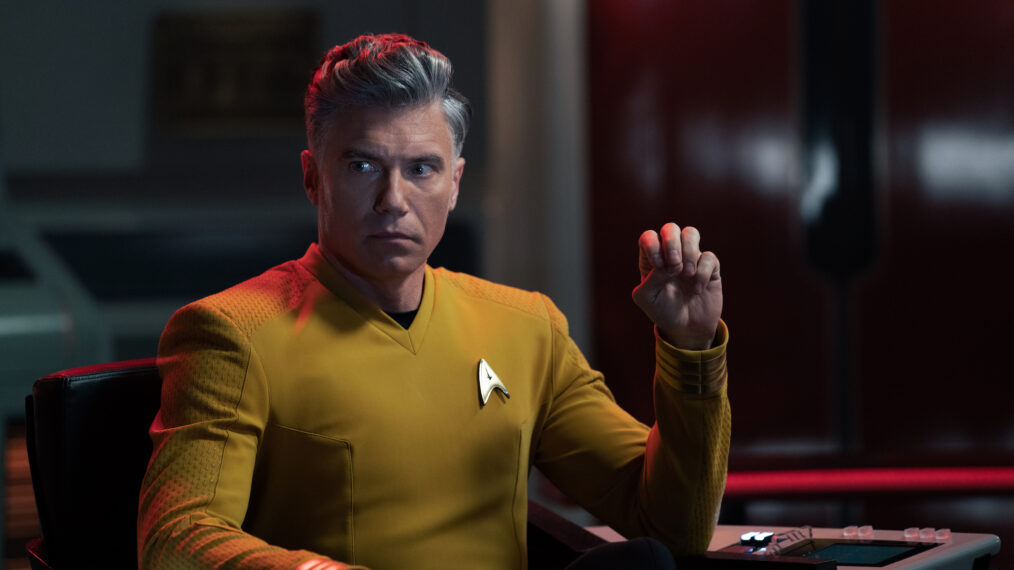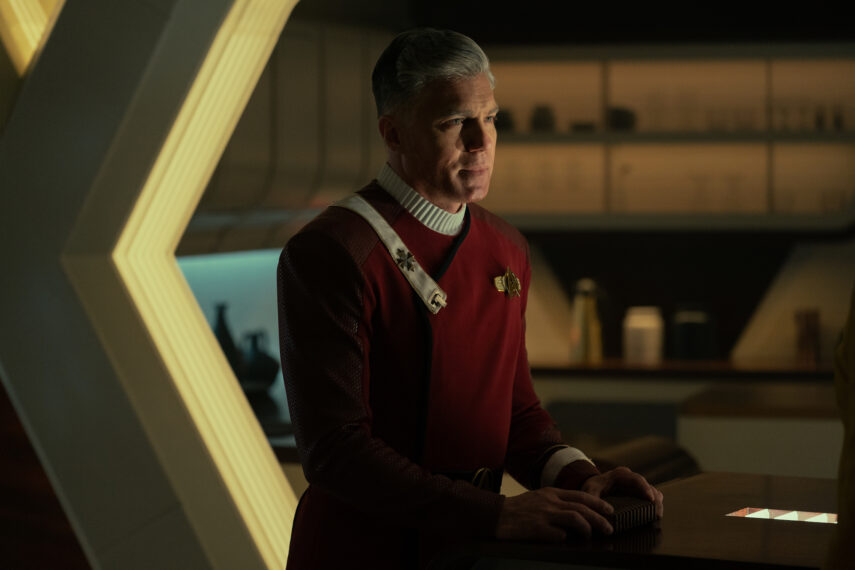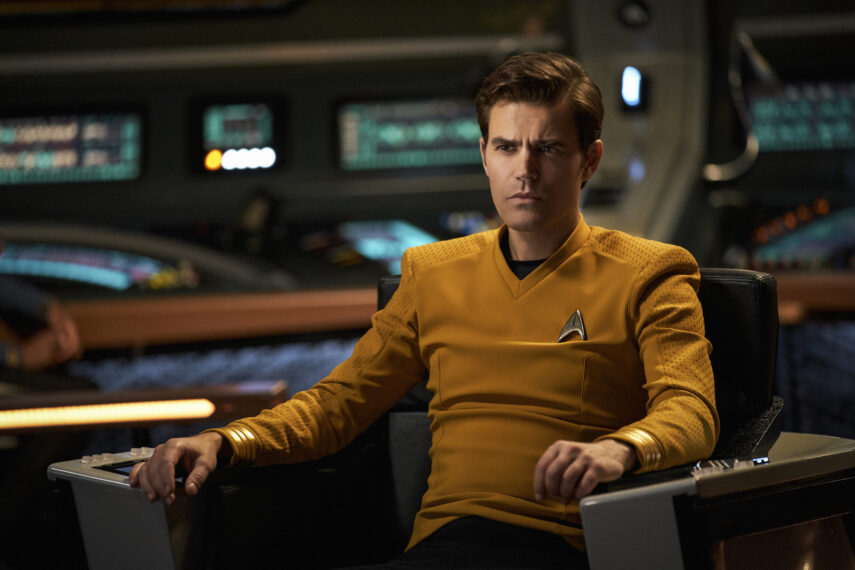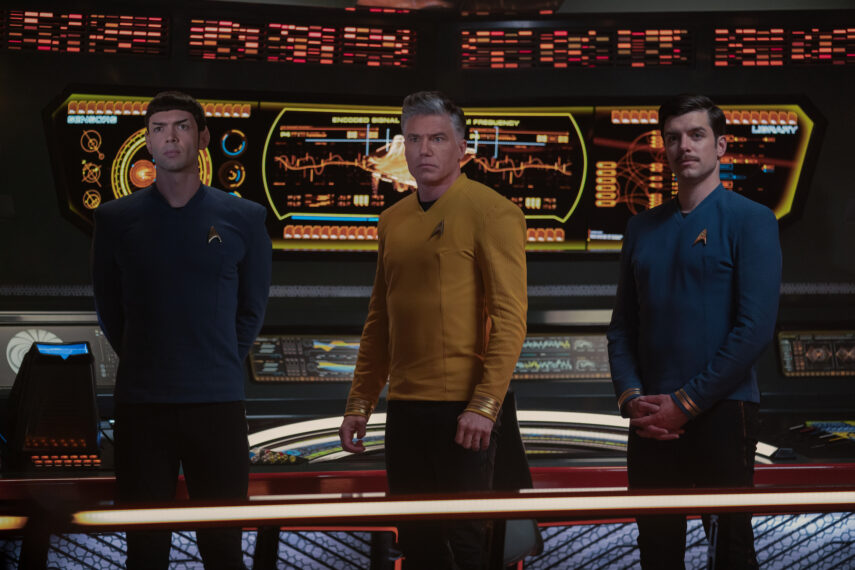
[Warning: The below contains MAJOR spoilers for the Star Trek: Strange New Worlds Season 1 finale “A Quality of Mercy.”]
Over the 10 episodes of its first season, Star Trek: Strange New Worlds easily established itself as one of the best shows of the year. And so what better way to cap it off than with a fantastic finale that feels like a movie, features a stellar performance from Anson Mount (as two Pikes!), and a surprise appearance from a character very familiar to Trek fans?
A future version of Pike visits the present-day one to show him a future in which he thwarts the fate that’s been haunting him since he saw it, and in it, he works alongside Captain James T. Kirk (Paul Wesley, whom we knew would be coming in Season 2) of the Farragut while facing off against the Romulans. During the battle, Spock (Ethan Peck) is severely injured. As a result, Pike returns to the present, having accepted his fate. But the Enterprise‘s next challenge arrives immediately: Starfleet learns Una (Rebecca Romijn) is Illyrian, and she’s arrested for violations of the anti-genetic modification directive.
TV Insider turned to co-showrunner/executive producer Henry Alonso Myers to find out what’s next.
Talk about bringing in Kirk like you did and the dynamics you wanted to show between him and Pike and him and Spock
Henry Alonso Myers: We wanted to figure out a finale that would feel very much like our show and not like any of the other shows because the other Trek shows have done these unbelievably huge, propulsive, expensive finales. It ended up becoming big, but our thought was, what if we go small? What if we find a way to remake a classic episode of Trek, but with our characters? Then we had been looking for a way to do a time travel story because you do a time travel story every season on Trek. That’s just how it always works. So what flavor of time travel are we gonna do?
I don’t remember where it came from because the room gets going, but I was really drawn to the idea of doing the Ghost of Pikemas Future is what we were calling him, the classic science fiction idea that your future self comes back and says, “Don’t go that way. Things are gonna be bad.” But once we got into it, once we were sort of redoing [Star Trek: The Original Series Season 1’s] “Balance of Terror,” it was very interesting because I literally had the original script out and there’s some sections where I would pull dialogue out and try to find ways to use that dialogue, but also make the dialogue change meaning because of what we were doing. We weren’t telling the same story.

Marni Grossman/Paramount+
We were trying to get at a couple ideas. One was the comparison of the two captains, Pike and Kirk — very different styles — and Pike realizing that his style was maybe not the right style for the moment, even though he absolutely followed every moral choice that made sense to him. But for whatever reason, this was not the choice that was good for the fate of the galaxy. Then the other thing was that he was, in doing this, potentially selfishly trading his fate for that of Spock’s, that Spock would have to suffer the fate that that he ultimately was trying to avoid.
The other thing that we wanted to explore, there’s this moment in [TOS‘] “The Menagerie” where Spock basically steals the Enterprise and does this big thing in order to — it’s like to pay off a debt to a captain that we didn’t really know yet. And so part of the idea was, what if we start to explore the idea here of where that debt came from, and it led to that scene that’s one of my favorite scenes in the episode where Spock talks to Pike at the end and says, “I have a feeling that I owe you a dead of gratitude, but I don’t know what for,” and Pike says, “you mean very much to me.”
Then there’s a lot of stuff about the future of Spock that tied into it because Spock and the Vulcan reunification and not to get all Trekkie. Part of the idea here was — I learned from working on The Magicians for years and I was a big fan of the books and part of the fun of that was trying to create a show where it worked for people who didn’t know the books at all and it works on an extra level for people who do. So we were trying very much to do a show, an episode in particular, that works for Trekkies, for people who know the material that we’re drawing from, and then for new people, it totally works too, because it’s its own story. You don’t have to know that we lifted wholesale a shot for shot section of “Balance of Terror,” which we did for fun, to enjoy it. But if you do know that and you are a Trek fan and you watch it, that’s gonna add an extra level of enjoyment to the show for you.

Marni Grossman/Paramount+
What can you say about the Kirk we’ll see in Season 2?
Totally different Kirk. The Kirk in this episode is seven years later. He is the Kirk of the same age and era, et cetera, as “Balance of Terror.” He’s a captain of the Farragut in our episode. The Kirk that we will come to know in Season 2 is younger. He’s not yet a captain, he’s a lieutenant. He’s working his way up to being the youngest first officer in the fleet. He still hasn’t figured everything out. He’s got a brother [Dan Jeannotte’s Sam] who is a member of our crew with whom he has a complicated relationship. In the same way that we explored the pasts of the people on our ship who eventually will become the members of the crew of the Original Series Enterprise, we want to explore his life.
He’s not yet that person. So he has not yet decided to be the things that we have come to know. We wanted to honor and explore genuinely the idea of a young Kirk in the same way we explore and honor the idea of a young Uhura [Celia Rose Gooding]. I sometimes will see online people kvetching about that there’s no tension because we know that these people will survive, but I don’t usually watch television myself because I don’t know if someone’s gonna live or die. I watch because I want to see them change. I watch because I want to see them learn. I watch because I want to see them act as characters. And for me, it’s way more interesting to see them learn life lessons that we all know that they probably got to but not be that person yet.

Marni Grossman/Paramount+
Speaking of changing, Pike accepted his fate because of what he saw with Spock. So what’s Pike like going forward and his relationship with Spock as a result?
I would say that their relationship is deepened, that they have a deeper trust and understanding of each other. Accepting his fate, not that we won’t ever explore it, but it was the idea that he couldn’t keep going back and forth. And in the future, we don’t spend a ton of time with Pike going, well, what if I change something to do it? This is really the moment that made him realize that he needed to accept it. And in the accepting of it, he becomes or recognizes that he is the hero that he is and it’s a very Pike thing, because I think it’s a heroic choice that he does quietly in silence to no applause, not important to him. It’s very much him kind of putting that aside and we hope allowing us in the future to explore completely different ideas with him. Season 2 Pike has a very different journey.
We know what’s coming for Spock and Kirk. What will we see from that relationship?
I’m not remembering which of the writers on our show I’m quoting, but there is a kind of father or uncle sort of relationship between our younger Spock and Pike. And then Kirk and Spock’s relationship is a little more that of contemporaries. The famous line, “I have been and always shall be your friend,” that’s who they are. And so that’s a journey that we haven’t seen on screen that could potentially be in the future that is just assumed when you watch TOS. They are different people in their lives at this moment, so they have different relationships.
You bookended the season with Una in trouble. While the premiere felt like something she could have gotten herself out of, this is very different. What can you say about what’s next?
It will become a big storyline in Season 2. We felt that the ideas that we began to explore in the beginning of Season 1 were not explored, I want to say, adequately enough for us. We wanted to do a deeper dive, and that was part of the idea. And in the process we’re gonna go on a journey through some other different genres of Trek in the process of digging into that.
Part of the fun of pulling some threads at the end of the season is if we as writers don’t know how we’re gonna get out of it, you as the audience probably don’t know how you’re gonna get out of it. And I will say when we wrote that, we didn’t know how we were gonna get out of it. Since then, we’ve actually shot the episodes, so I have a better idea now, but at the time… Our big goal in Season 2 was just to kind of do everything but bigger.
Star Trek: Strange New Worlds, Season 2, TBA, Paramount+
